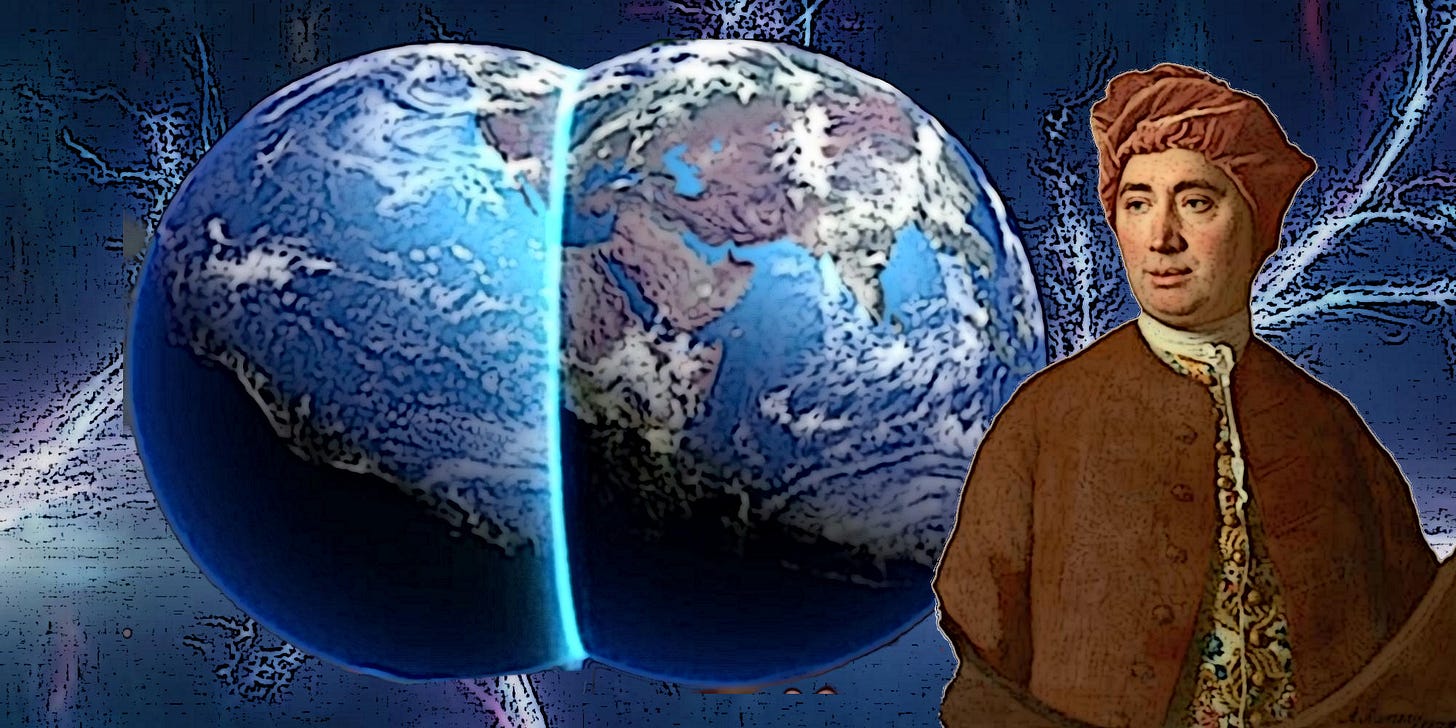Freedom is Necessity
Upending the lazy dogmas of free will with the bad boy of Scottish philosophy, David Hume
“Liberty, when opposed to necessity, not to constraint, is the same thing with chance; which is universally allowed to have no existence.” - David Hume, 1777
Our science fiction stories are now awash with tales in which the protagonist takes one course of action in one timeline, while in another branch they act differently resulting in a completely different set of circumstances. Indeed, the whole idea of a ‘branch’ in the continuity of time is so embedded into genre fiction now that it is the norm to imagine the space-time continuum as a widening bush, and exceptionally rare that we will encounter any image of time as a fixed sequence of events.
It may therefore seem as if determinism - the idea of a necessity in human affairs, or of an ordained fate or destiny - is dead. But there are a slew of academics who insist that the idea we might choose differently (i.e. of a different branch in the timeline) is illusory. In its strongest form, they claim our conscious experience is merely “an elaborate post-hoc rationalization of things you really do for other reasons”, as neurologist Vilayanur Ramachandran put the matter. The argument goes like this: since cause reliably follows effect in all other affairs, our deterministic universe leaves no room for the kind of free choice that could result in a ‘branch’ of the timeline, therefore we have no freedom.
Yet those preparing for university at the commencement of the twentieth century would never have fallen for such obvious bunk, because such scholars would have read the work of the Scottish philosopher and intellectual rake David Hume. Once considered an important part of our intellectual heritage, Hume is now consigned to the academic ghetto. This is unfortunate, not only because Hume’s challenges have never ceased to be relevant to the human experience, but also because Hume’s provocations directly inspired Immanuel Kant, who declared that Hume “awoke him from his dogmatic slumber.” And there is no shortage of ‘dogmatic slumber’ around these days!
In 1738, Hume set out to torture lazy dogmatists with a series of ingenious twists on familiar assumptions, with a revised account appearing at the end of his life in 1777. When it comes to free will, Hume demolished what had been a major debate throughout the medieval period concerning “the question of liberty and necessity”, which he called “the most contentious question of metaphysics, the most contentious science”, suggesting that the entire dispute was merely a confusion of terms.
Hume made clear that whatever quarrels had broken out over this subject, nobody (until our naïve contemporary neurologists, at least) disputed either liberty or necessity. Cause follows effect reliably, and meaningful choice was central to Christian doctrine, which dominated Hume’s time. The idea that necessity (effect following cause) precluded liberty (free choice) simply could not be a valid concern, because to suggest a different decision could have been made would be tantamount to breaking causality. It meant imagining some random element intervened. Yet if chance was involved in our decision making, we could hardly claim to have ownership over our choices!
By carefully defining necessity and liberty, Hume demonstrates no contradiction between them. The assumption that ‘we could have chosen differently’ has a rather suspicious meaning when examined closely, since (Hume suggests) we need determinism to make sense of our choices, lest they unravel into mere randomness. We undertake a risky metaphysical gambit when we think ‘choosing freely’ must mean the possibility of different outcomes, since we only ever exist within time, and within just one sequence of events. Far from necessity being the enemy of liberty, freedom requires necessity or else human behaviour becomes nonsensical.
We should expect - indeed, require! - that our free choices result from our “motives, inclinations, and circumstances”. If this were not so, if ‘running it again’ resulted in a different outcome, as our popular sci-fi tales have it, we could never claim to have free will, because our behaviour would in essence be random. As Hume puts it, liberty can only mean “a power of acting or not acting, according to the determinations of the will”, and this requires the necessity of cause or effect, or else all human behaviour would border upon meaningless gibberish we could never comprehend. Free will cannot mean that in a parallel universe you chose differently: a different outcome would mark a different person. Rather, freedom is necessity, for who we are is the absolute determinant of what we do.






Hi Chris,
The subject of this post is an important one for me, but I’m having trouble understanding your remarks on Hume’s work. I have a pdf of Hume’s “A Treatise of Human Nature” and am about to undertake a study of Book2/Part3: “Of the will and direct passions” but I know from a previous attempt to understand Hume that it’s going to be a rough sled.
Reasoning sound, but I take issue with the assumption that human behaviour makes sense in a Newtonian way as cause and effect. I agree however that the idea of universes splitting away into probability trees is a hallucination of the math and has nothing to do with reality.